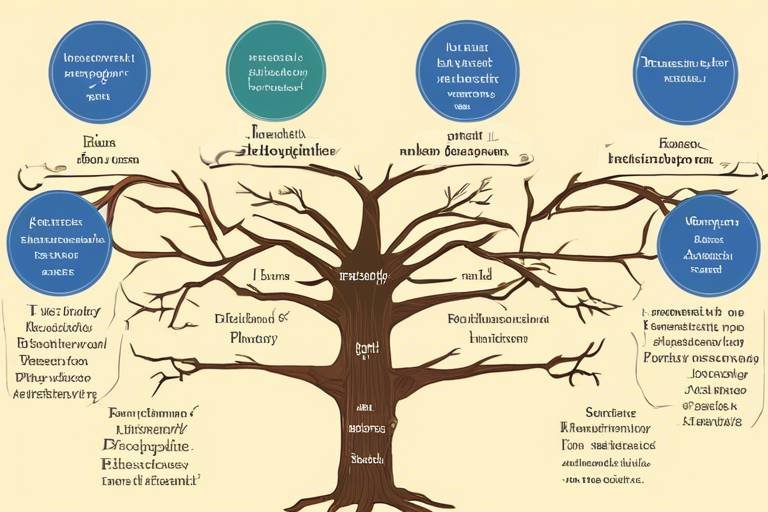Philosophy Behind Social Inequalities
The exploration of social inequalities is not just about numbers and statistics; it delves deep into the very fabric of our societies. At its core, the seeks to understand the underlying principles that shape disparities in wealth, power, and opportunity. These inequalities are not mere accidents of history; they are often rooted in complex social, economic, and political systems that have evolved over centuries. By examining these systems, we can uncover the philosophical questions that arise: What is fair? Who decides what is just? And how do we reconcile the existence of such disparities with our moral beliefs?
Throughout history, thinkers have grappled with these questions, offering various frameworks to interpret the world around us. From the ancient philosophers who pondered justice and virtue to contemporary theorists who analyze structural inequalities, the discourse surrounding social inequalities is rich and multifaceted. It challenges us to reflect on our own positions within these structures and consider our responsibilities toward those who are disadvantaged.
Moreover, the implications of social inequalities extend beyond individual experiences; they affect entire communities and nations. For instance, economic disparities can lead to social unrest, while systemic racism perpetuates cycles of disadvantage that are difficult to break. The philosophical inquiry into these issues is not merely academic; it is vital for fostering a more equitable society. By understanding the roots of inequality, we can begin to envision solutions that promote fairness and justice.
As we navigate through the complexities of social inequalities, we must also consider the ethical dimensions. Questions of moral responsibility and social justice compel us to think critically about our roles in perpetuating or challenging these disparities. Are we passive observers, or do we have a duty to act? The answers to these questions will shape the future of our societies and the lives of countless individuals.
In summary, the philosophy behind social inequalities is a profound inquiry into the nature of justice, equity, and human dignity. It invites us to engage with the world around us and to seek a deeper understanding of the forces that shape our lives. As we continue this exploration, let us remain open to the insights that philosophy offers, guiding us toward a more just and inclusive society.
- What are social inequalities? Social inequalities refer to the unequal distribution of resources, opportunities, and privileges among different groups in society.
- Why is it important to study the philosophy behind social inequalities? Understanding the philosophy helps us critically analyze the structures and systems that perpetuate inequality, guiding us toward solutions.
- How do historical contexts influence current social inequalities? Historical events and decisions shape societal norms and institutions, impacting the distribution of wealth and power today.
- What philosophical theories address social inequalities? Key theories include utilitarianism, Marxism, and liberalism, each offering unique perspectives on the causes and implications of inequality.
- How can individuals contribute to reducing social inequalities? Individuals can engage in advocacy, support equitable policies, and educate themselves and others about the issues at hand.

Historical Context of Social Inequalities
This article explores the philosophical foundations of social inequalities, examining their causes, implications, and the ethical considerations surrounding them to foster a deeper understanding of societal structures.
Understanding the historical roots of social inequalities is essential to grasp how past events shape current societal structures and contribute to ongoing disparities in wealth, power, and opportunity. Throughout history, various factors have played a pivotal role in creating and perpetuating these inequalities. From colonialism to industrialization, the socio-economic landscape has been significantly influenced by historical events that often favored certain groups over others.
For instance, during the era of colonial expansion, European powers exploited resources and labor from colonized nations, establishing a hierarchy that favored the colonizers. This exploitation laid the groundwork for enduring economic disparities that persist to this day. Similarly, the industrial revolution transformed economies but also led to the rise of a working class that faced harsh conditions and limited rights, creating a stark contrast between the wealthy industrialists and the laborers.
Moreover, the legacy of slavery has left an indelible mark on social structures, particularly in countries like the United States. The systemic racism that emerged from this dark chapter in history continues to manifest in various forms, including economic disadvantage and social exclusion for marginalized communities. Understanding these historical contexts is not merely an academic exercise; it is crucial for recognizing the persistent inequalities that affect individuals today.
To illustrate the timeline of significant events that have contributed to social inequalities, consider the following table:
| Event | Impact on Social Inequalities |
|---|---|
| Colonialism (15th-20th Century) | Exploitation of resources and labor, establishment of racial hierarchies. |
| Industrial Revolution (18th-19th Century) | Creation of a working class with limited rights, widening gap between rich and poor. |
| Slavery Abolition (19th Century) | Legacy of systemic racism and economic disadvantage for formerly enslaved populations. |
| Civil Rights Movement (1960s) | Struggle for equality highlighted ongoing racial and economic disparities. |
In addition to these historical events, cultural narratives and societal norms have also played a significant role in shaping perceptions of inequality. For example, the idea of the "American Dream" has often been touted as a promise of equal opportunity. However, the reality is that not everyone starts from the same place, and systemic barriers can make this dream elusive for many.
In essence, the historical context of social inequalities is a complex tapestry woven from various threads of exploitation, oppression, and resistance. By examining these historical dynamics, we can better understand the structural inequalities that persist today and the ethical responsibilities we hold in addressing them.
- What are social inequalities? Social inequalities refer to the unequal distribution of resources, opportunities, and privileges within a society.
- How do historical events shape current inequalities? Historical events create systems and structures that often favor certain groups, leading to long-lasting disparities.
- Why is it important to study the history of social inequalities? Understanding the history helps identify root causes and informs strategies for addressing and mitigating these inequalities.

Key Philosophical Theories
This article explores the philosophical foundations of social inequalities, examining their causes, implications, and the ethical considerations surrounding them to foster a deeper understanding of societal structures.
Understanding the historical roots of social inequalities is essential to grasp how past events shape current societal structures and contribute to ongoing disparities in wealth, power, and opportunity.
When diving into the ocean of social inequalities, it’s crucial to anchor ourselves in the various philosophical theories that attempt to explain their existence and impact. Each theory offers a unique lens through which we can analyze the complexities of inequality, making it easier to understand not just the what but the why behind these disparities. Among the most significant theories are utilitarianism, Marxism, and liberalism. Each of these frameworks provides different insights and potential pathways toward addressing the moral implications of social inequality.
Utilitarianism, a philosophy that champions the greatest good for the greatest number, evaluates social inequalities based on their overall impact on happiness and welfare. It raises thought-provoking questions: Can inequalities be justified if they lead to a net increase in happiness? For instance, if a society's wealth is concentrated among a few but it results in job creation and economic growth, does that make the inequality acceptable? This perspective urges us to consider the broader consequences of inequality rather than focusing solely on individual cases.
However, the utilitarian approach is not without its critics. Detractors argue that this theory can easily overlook individual rights and lead to justifications for harmful inequalities. Imagine a scenario where the majority benefits at the expense of a minority—utilitarianism might endorse this as a necessary evil for the greater good. This critique highlights the need for a more nuanced ethical framework when addressing social disparities, one that balances collective welfare with individual rights.
Despite its critiques, utilitarian principles can serve as a guiding light for policymakers. By assessing the consequences of social programs, decision-makers can aim to improve overall well-being while navigating the complexities of inequality. For example, when designing welfare programs, a utilitarian approach would analyze how these initiatives impact the happiness and welfare of the community as a whole, striving to maximize benefits while minimizing harm.
On the other end of the spectrum, Marxism offers a critical lens on social inequalities, particularly within capitalist systems. Marxists argue that these inequalities stem from class struggles and exploitation, emphasizing the need for systemic change to achieve true equality and social justice. In this view, the rich get richer while the poor remain trapped in a cycle of poverty, highlighting the inherent flaws in a system that prioritizes profit over people.
By analyzing the capitalist structure, Marxism calls for revolutionary changes, advocating for a redistribution of resources and power. This perspective challenges us to think about the roles we play in perpetuating or dismantling these inequalities and pushes for a more equitable society where everyone has a stake in the resources they help create.
The ethical considerations surrounding social inequalities raise questions about justice, fairness, and moral responsibility, prompting discussions on how societies can address and mitigate these disparities.
Theories of justice, such as Rawlsian justice, propose frameworks for evaluating social inequalities, advocating for principles that ensure fairness and equitable distribution of resources within society. Rawls argues for a system where the least advantaged are prioritized, suggesting that a just society is one where inequalities are arranged to benefit the most disadvantaged members.
Discussions on individual responsibility and societal agency explore the extent to which individuals can influence social inequalities, challenging the notion of determinism and emphasizing the role of choice and action. Are we merely products of our environment, or do we have the power to alter our circumstances? This ongoing debate is vital in understanding how social inequalities can be addressed and transformed.
Today, social inequalities manifest in various forms, including economic disparity, racial injustice, and gender inequality, necessitating a contemporary analysis of their effects on individuals and communities.
A global view of social inequalities highlights the interconnectedness of societies, revealing how issues like poverty and discrimination transcend borders and require collaborative solutions from multiple stakeholders. In our increasingly globalized world, understanding these connections is crucial for fostering a more just society.
Addressing social inequalities demands innovative approaches and policies that promote inclusivity and equity, ensuring that future generations benefit from a more just and equitable society.
- What are the main causes of social inequalities? Social inequalities stem from various factors, including historical injustices, economic structures, and systemic discrimination based on race, gender, and class.
- How can philosophical theories help address social inequalities? Philosophical theories provide frameworks for understanding the moral implications of inequality and can guide policies aimed at promoting fairness and justice.
- Is utilitarianism a valid approach to social inequalities? While utilitarianism offers valuable insights, it is often criticized for neglecting individual rights, necessitating a more balanced ethical framework.
- What role does individual responsibility play in social inequalities? Individual responsibility can influence social inequalities, but systemic factors often play a more significant role in shaping opportunities and outcomes.

Utilitarian Perspectives
Utilitarianism, at its core, revolves around the principle of maximizing overall happiness and welfare. This philosophical framework suggests that the best action is the one that produces the greatest good for the greatest number of people. When we apply this theory to social inequalities, we find ourselves grappling with a complex web of moral dilemmas. Can we justify disparities in wealth and opportunity if they lead to a net increase in happiness? This question lies at the heart of utilitarian thought, inviting us to explore the implications of our societal structures.
One of the most compelling aspects of utilitarianism is its focus on outcomes rather than intentions. For instance, a government policy aimed at improving education might inadvertently widen the gap between the wealthy and the poor. If the wealthier classes can afford better educational resources, while the less fortunate struggle to access basic education, the resultant inequality could lead to societal discord. Here, utilitarianism encourages us to weigh the benefits against the potential harms, pushing us to consider whether the policy truly serves the greater good.
Utilitarian perspectives can also be applied in various sectors, such as healthcare, where decisions often hinge on resource allocation. Imagine a scenario where a limited budget must be divided among different health initiatives. A utilitarian approach would advocate for funding the program that serves the largest number of people, even if it means that some individuals with rare conditions receive less attention. This raises ethical questions: Is it fair to prioritize the majority over the minority? Are we sacrificing individual rights for the sake of collective happiness?
To further illustrate the utilitarian perspective, consider the following table that outlines the potential benefits and drawbacks of utilitarianism in addressing social inequalities:
| Aspect | Benefits | Drawbacks |
|---|---|---|
| Policy Making | Focus on maximizing overall welfare | Potential neglect of individual rights |
| Resource Allocation | Efficient use of limited resources | Marginalization of vulnerable groups |
| Social Programs | Improvement of general living standards | Risk of justifying harmful inequalities |
Critics of utilitarianism argue that its emphasis on the collective can lead to troubling outcomes. For example, when the happiness of the majority is prioritized, the rights and needs of minorities may be overlooked. This critique highlights the necessity for a more nuanced ethical framework that considers not just the end results, but also the means by which we achieve them. Are we willing to accept a system that sacrifices the well-being of a few for the happiness of many? This question invites us to rethink how we approach social inequalities.
In practice, utilitarian principles can guide policy-making in a variety of ways. For instance, when evaluating social programs, decision-makers can assess the potential consequences of their actions, aiming to enhance overall well-being while navigating the complexities of inequality. This approach encourages a dynamic dialogue between ethics and practicality, reminding us that social policies are not merely theoretical constructs but have real-world implications that affect people's lives.
Ultimately, utilitarian perspectives challenge us to reflect on our values and priorities as a society. By questioning whether the pursuit of happiness for the majority justifies the existence of social inequalities, we are prompted to explore deeper ethical considerations. Can we create a society that not only aims for the greatest good but also respects individual rights and fosters true equality? This ongoing conversation is essential as we strive toward a more just and equitable world.
- What is utilitarianism? Utilitarianism is a moral philosophy that advocates for actions that maximize happiness and welfare for the greatest number of people.
- How does utilitarianism relate to social inequalities? Utilitarianism evaluates social inequalities by questioning whether the disparities can be justified if they contribute to the overall happiness of society.
- What are the critiques of utilitarianism? Critics argue that utilitarianism may overlook individual rights, leading to justifications for harmful inequalities.
- How can utilitarianism guide policy-making? Utilitarian principles can help assess the consequences of social programs, aiming to improve overall well-being.

Critiques of Utilitarianism
Utilitarianism, while a compelling framework for evaluating social inequalities, is not without its critics. One of the primary concerns is that it tends to prioritize the collective good over individual rights. Imagine a scenario where the happiness of the majority is achieved at the expense of a minority's well-being. This raises a critical question: should the happiness of many outweigh the suffering of a few? Critics argue that this approach can lead to justifications for harmful inequalities, where the needs of the few are sacrificed on the altar of the greater good.
Furthermore, utilitarianism often struggles with the challenge of measuring happiness and welfare. How do we quantify happiness? Is it a matter of wealth, health, or perhaps something more abstract, like fulfillment? This ambiguity can lead to inconsistencies in policy-making. For instance, if a government decides to allocate resources based solely on utilitarian principles, it might favor programs that benefit the majority while neglecting marginalized groups, further entrenching existing inequalities.
Another critique centers around the concept of long-term vs. short-term happiness. Utilitarianism might justify actions that produce immediate benefits but overlook their long-term consequences. For example, a policy that boosts economic growth in the short term might lead to environmental degradation, adversely affecting future generations. This raises the ethical dilemma of whether we should prioritize current happiness at the expense of future well-being.
Moreover, utilitarianism can sometimes foster a sense of complacency regarding social injustices. If society perceives that overall happiness is being achieved, there may be less motivation to address systemic issues. This can create a dangerous cycle where inequalities persist, as the focus remains on the aggregate happiness rather than the equitable distribution of resources.
In light of these critiques, there is a growing recognition of the need for a more nuanced ethical framework when addressing social disparities. This could involve integrating principles from other philosophical theories, such as rights-based approaches, which emphasize the importance of protecting individual freedoms and dignity. By doing so, we can aim for a more balanced perspective that considers both the collective good and the rights of individuals.
- What is utilitarianism? Utilitarianism is an ethical theory that evaluates the morality of actions based on their outcomes, specifically aiming for the greatest happiness for the greatest number.
- Why is utilitarianism criticized? Critics argue that it can overlook individual rights, justify harmful inequalities, and struggle with measuring happiness effectively.
- How can utilitarianism be applied in policy-making? Utilitarian principles can guide decisions by assessing the overall consequences of social programs, aiming to maximize well-being while addressing complexities of inequality.
- What alternatives exist to utilitarianism? Alternatives include rights-based approaches and theories of justice, which prioritize individual rights and equitable resource distribution.

Applications of Utilitarianism
Utilitarianism, with its foundational principle of maximizing happiness for the greatest number, finds its application in various spheres of social policy and ethical decision-making. Imagine a world where decisions are made not just based on personal biases or political agendas, but rather through a lens that prioritizes collective well-being. This is the essence of utilitarianism in action. By evaluating the potential outcomes of policies and actions, utilitarianism provides a framework that can guide lawmakers and social leaders in crafting initiatives that aim to alleviate social inequalities.
For instance, consider a government contemplating a new healthcare policy. A utilitarian approach would involve assessing how this policy impacts the health and happiness of the population as a whole. If the proposed policy is likely to improve health outcomes for a majority, even if it requires some sacrifices from a minority, it may be justified under utilitarian principles. However, this raises questions about the moral weight of individual rights versus collective benefits. Are we comfortable with the idea that some may suffer for the greater good? This dilemma is where the critique of utilitarianism becomes significant, yet its applications remain vital.
Utilitarianism also extends into areas such as education, environmental policy, and economic reform. For example, in education, policies aimed at increasing funding for underprivileged schools can be justified if they lead to improved educational outcomes for a larger number of students. Similarly, environmental regulations that may impose costs on businesses can be defended if they result in significant long-term benefits for society, such as cleaner air and water, which ultimately enhance public health and happiness.
To further illustrate the applications of utilitarianism, consider the following table that summarizes several key areas where utilitarian principles can be applied:
| Area of Application | Utilitarian Approach | Potential Outcomes |
|---|---|---|
| Healthcare | Assessing policies based on overall health improvements | Increased life expectancy and reduced healthcare costs |
| Education | Funding allocation for schools based on student performance | Higher graduation rates and better job prospects |
| Environmental Policy | Regulations aimed at reducing pollution | Healthier communities and sustainable ecosystems |
| Economic Reform | Tax policies designed to reduce poverty | Greater economic stability and improved quality of life |
In summary, the application of utilitarianism in social policies serves as a guiding principle that encourages decision-makers to prioritize the common good. It challenges us to think critically about the consequences of our actions, urging a balance between individual rights and collective welfare. However, while utilitarianism provides a valuable framework, it is essential to remain vigilant about its limitations and the ethical implications of prioritizing the majority over the minority. As we strive for a more equitable society, integrating utilitarian principles with other ethical considerations can lead to more comprehensive and just solutions.
- What is utilitarianism? Utilitarianism is an ethical theory that suggests actions are right if they promote the greatest happiness for the greatest number of people.
- How does utilitarianism apply to social policy? Utilitarianism guides policymakers to evaluate the consequences of their decisions, aiming to maximize overall well-being.
- What are some criticisms of utilitarianism? Critics argue that utilitarianism can overlook individual rights and lead to justifications for harmful inequalities.
- Can utilitarianism coexist with other ethical frameworks? Yes, integrating utilitarian principles with other ethical theories can provide a more nuanced approach to addressing social inequalities.

Marxist Analysis
Marxism offers a profound critique of the capitalist system, positing that social inequalities are not merely incidental but rather fundamental to the very structure of capitalism itself. According to Marxist theory, the capitalist mode of production inherently leads to class struggles, where the bourgeoisie (the owners of the means of production) exploit the proletariat (the working class). This exploitation creates a chasm between the wealthy elite and the impoverished masses, perpetuating cycles of inequality that are deeply entrenched in societal norms and economic systems.
At the heart of Marxist analysis is the idea that social inequalities arise from economic relationships and the power dynamics they engender. For Marxists, the struggle between different classes is not just a historical phenomenon but an ongoing reality that shapes the lives of individuals across generations. The capitalist system's focus on profit maximization often comes at the expense of workers' rights, leading to poor working conditions, low wages, and a lack of social mobility. This creates a society where wealth is concentrated in the hands of a few, while the majority struggle to meet their basic needs.
Marxism also emphasizes the importance of collective action in challenging these inequalities. It argues that true equality cannot be achieved through reformist measures alone but requires a radical transformation of the socio-economic structure. This perspective encourages solidarity among the working class, advocating for a united front against the oppressive mechanisms of capitalism. By understanding the root causes of their exploitation, individuals are empowered to demand systemic change, whether through labor movements, political activism, or social revolutions.
One of the key contributions of Marxist thought is its analysis of ideology and how it perpetuates social inequalities. Marx argued that dominant ideologies serve to justify the status quo, masking the exploitative nature of capitalism and leading individuals to accept their position within the social hierarchy. This can be seen in various forms, such as:
- Consumerism: The belief that happiness and fulfillment can be achieved through material possessions, diverting attention from systemic issues.
- Meritocracy: The idea that success is solely based on individual effort, ignoring the structural barriers that hinder many from achieving their potential.
- Nationalism: A focus on national identity that can overshadow class solidarity, pitting workers against each other based on arbitrary lines.
In conclusion, Marxist analysis provides a critical lens through which to view social inequalities, challenging us to question the underlying economic structures that perpetuate disparities. By recognizing the interconnectedness of class struggles and advocating for systemic change, we can begin to envision a society where equality is not just an ideal, but a tangible reality.
What is the main argument of Marxism regarding social inequalities?
Marxism argues that social inequalities are rooted in the capitalist system, where the bourgeoisie exploit the proletariat, leading to class struggles and systemic disparities.
How does Marxism propose to address social inequalities?
Marxism advocates for a radical transformation of society through collective action and solidarity among the working class, rather than relying on reformist measures.
What role does ideology play in perpetuating social inequalities according to Marxism?
Ideology serves to justify the status quo, masking the exploitative nature of capitalism and leading individuals to accept their social positions instead of challenging them.

Ethical Implications of Inequality
The ethical implications of social inequalities are profound and multifaceted, raising critical questions about what constitutes justice and fairness in our societies. As we delve into this topic, it's essential to understand that inequality is not just a statistic; it affects real lives, shaping opportunities and outcomes for individuals and communities alike. The disparities we see today—whether in wealth, education, or healthcare—call into question our moral responsibilities as members of a society. Are we doing enough to address these inequalities, or are we complicit in their perpetuation?
One of the most pressing ethical concerns surrounding inequality is the notion of justice. Philosophers like John Rawls have proposed frameworks that advocate for fairness and equitable distribution of resources. Rawlsian justice emphasizes the "veil of ignorance," a thought experiment where decision-makers design a society without knowing their own social status. This approach aims to ensure that policies benefit the least advantaged, thereby promoting a more equitable society. However, implementing such ideals in a world rife with systemic barriers is no small feat.
Moreover, the question of responsibility arises when discussing social inequalities. To what extent are individuals responsible for their circumstances? This debate often pits the idea of personal agency against structural determinism. While some argue that hard work and determination can overcome obstacles, others point to the significant role that systemic issues—such as racism, sexism, and economic barriers—play in shaping outcomes. As we navigate these complexities, it’s crucial to recognize that individual actions can indeed influence social inequalities, but they often exist within a framework that limits or enhances those choices.
To illustrate the ethical considerations further, consider the following table that highlights various ethical theories and their perspectives on inequality:
| Theory | Perspective on Inequality |
|---|---|
| Utilitarianism | Evaluates inequalities based on overall happiness; justifies disparities if they lead to greater overall good. |
| Rawlsian Justice | Advocates for fairness and supports policies that benefit the least advantaged. |
| Marxism | Critiques capitalism; sees inequality as a result of class struggle and exploitation. |
| Libertarianism | Emphasizes individual rights and freedoms; often opposes redistribution of wealth. |
As we examine these theories, it becomes clear that addressing social inequalities is not merely a matter of economic redistribution. It involves a deep ethical commitment to understanding and dismantling the systemic barriers that perpetuate injustice. The implications of ignoring these disparities can be dire, leading to social unrest, decreased trust in institutions, and a fractured society. Thus, it is imperative for us to engage in ongoing discussions about our moral responsibilities and the actions we can take to foster a more equitable world.
- What are the main causes of social inequalities? Social inequalities arise from a combination of historical, economic, and social factors, including systemic discrimination, unequal access to education, and wealth concentration.
- How can we address social inequalities? Addressing social inequalities requires a multifaceted approach, including policy reforms, community engagement, and education to raise awareness about these issues.
- What role do individuals play in combating inequality? Individuals can contribute by advocating for equitable policies, supporting marginalized communities, and challenging discriminatory practices within their spheres of influence.

Justice Theories
When we dive into the realm of , we're really embarking on a journey to understand what it means to live in a fair and equitable society. These theories grapple with fundamental questions: What is justice? How should resources be distributed? And who gets to decide? Among the most influential frameworks is John Rawls' theory of justice, which posits that a just society is one that ensures the greatest benefit to its least advantaged members. Rawls introduces the concept of the "veil of ignorance," a thought experiment that challenges us to consider how we would design a society if we were unaware of our own social status. This approach encourages fairness by prompting us to think about the needs of the most vulnerable.
Moreover, justice theories can be categorized into several schools of thought, each offering unique perspectives on how to achieve fairness. For example, distributive justice focuses on the equitable allocation of resources, while retributive justice emphasizes the importance of punishment in maintaining social order. Another critical aspect is procedural justice, which highlights the significance of fair processes in decision-making. Understanding these distinctions can help us navigate the complexities of social inequalities and inform our responses to them.
Additionally, the practical implications of these theories can be seen in various societal debates. For instance, consider the ongoing discussions around universal healthcare. Proponents argue that access to healthcare is a fundamental right, aligning with Rawlsian principles that advocate for the welfare of the least advantaged. On the other hand, critics may argue from a libertarian standpoint, emphasizing individual responsibility and the right to choose. This clash of ideas illustrates how justice theories shape our understanding of societal obligations and individual rights.
To further illustrate the differences in justice theories, let's take a look at the following table:
| Theory | Focus | Key Proponents |
|---|---|---|
| Distributive Justice | Equitable allocation of resources | John Rawls, Amartya Sen |
| Retributive Justice | Importance of punishment | Immanuel Kant, Hegel |
| Procedural Justice | Fairness in decision-making processes | John Stuart Mill, Robert Nozick |
Ultimately, engaging with these theories allows us to critically assess the structures that uphold social inequalities. By understanding the philosophical underpinnings of justice, we can better advocate for policies and practices that promote equity and challenge systemic injustices. It's about recognizing that every individual deserves a fair chance, and that our collective responsibility is to create a society where justice is not just an ideal, but a lived reality.
- What is the main idea behind justice theories? Justice theories explore the principles of fairness and equity in society, examining how resources and opportunities should be distributed among individuals.
- Who is John Rawls and why is he important? John Rawls was an influential philosopher known for his theory of justice, which emphasizes fairness and the welfare of the least advantaged members of society.
- How do justice theories apply to modern issues? Justice theories provide frameworks for analyzing contemporary social issues, such as healthcare access and income inequality, guiding discussions on how to achieve a fairer society.

Responsibility and Agency
When we dive into the intricate web of social inequalities, one of the most compelling questions arises: To what extent are individuals responsible for their circumstances? This question is pivotal because it challenges the prevailing notion of determinism—the idea that our lives are largely shaped by external factors beyond our control. In reality, the interplay between personal responsibility and societal structures is complex and multifaceted. On one hand, individuals make choices that affect their lives; on the other hand, these choices are often constrained by the socio-economic environment they inhabit.
To illustrate this complexity, consider the following scenarios:
- A person born into a wealthy family has access to quality education, healthcare, and networking opportunities, which can significantly enhance their life prospects.
- Conversely, an individual from a low-income background may face systemic barriers that limit their access to similar resources, regardless of their personal ambitions or efforts.
This dichotomy raises profound ethical implications. Should we hold individuals accountable for their success or failure when the playing field is inherently uneven? The answer is not straightforward. Many argue that while individuals possess agency—the ability to make choices and take actions—they are also influenced by the opportunities available to them. This leads us to the concept of social agency, which emphasizes that individuals can influence their circumstances, but must also navigate the constraints imposed by societal structures.
Furthermore, the discussion of responsibility and agency often intersects with issues of privilege and disadvantage. Those with privilege may find it easier to exercise their agency, while those facing systemic disadvantages may struggle to assert their influence. This raises critical questions about the role of society in leveling the playing field. Are we doing enough to empower individuals from marginalized backgrounds? Are we recognizing the systemic barriers that impede their agency?
To address these questions effectively, we must adopt a holistic approach that considers both individual choices and structural factors. It’s essential to foster environments that encourage personal responsibility while also dismantling the barriers that hinder agency. This could involve:
- Implementing educational programs that equip individuals with the skills and knowledge necessary to navigate their circumstances.
- Creating policies that promote equitable access to resources, such as healthcare, housing, and employment opportunities.
- Encouraging community engagement and support systems that empower individuals to take action within their own lives.
In conclusion, understanding responsibility and agency in the context of social inequalities is not just an academic exercise; it is a call to action. By recognizing the nuances of personal choice and systemic influence, we can work towards a society that not only values individual agency but also actively seeks to remove the barriers that limit it. This dual approach is vital for fostering true equality and empowering all individuals to shape their own destinies.
- What is the difference between responsibility and agency?
Responsibility refers to the obligation to act or respond in a certain way, while agency refers to the capacity to make choices and take actions that affect one's life. - How do social structures impact individual agency?
Social structures can create barriers or provide opportunities that influence an individual's ability to make choices and take action. - Can individuals change their circumstances despite systemic barriers?
Yes, while systemic barriers exist, individuals can still exercise agency and make choices that lead to change, though it may be more challenging.

Modern Implications of Social Inequalities
Today, social inequalities are more pronounced than ever, manifesting in various forms that touch every aspect of our lives. From economic disparity to racial injustice and gender inequality, these issues are not just abstract concepts; they have real, tangible effects on individuals and communities. The implications of these inequalities are far-reaching, influencing everything from education and employment opportunities to health outcomes and social mobility. When we think about the modern implications of social inequalities, it's essential to recognize that these disparities are not isolated; they are interconnected and often compound one another.
Take, for instance, the intersection of race and economic status. Studies show that individuals from marginalized racial backgrounds are disproportionately affected by poverty. According to recent statistics, the poverty rate for Black Americans is significantly higher than that of their white counterparts. This economic disadvantage limits access to quality education and healthcare, perpetuating a cycle of inequality that can last for generations. In this way, social inequalities are like a web, where one strand affects another, creating a complex tapestry of disadvantage that is challenging to untangle.
Furthermore, gender inequality continues to be a pressing issue in many societies. Women, particularly women of color, face unique challenges in the workforce, often earning less than their male counterparts for the same work. This wage gap not only affects individual families but also has broader economic implications. When women are not compensated fairly, it limits their ability to invest in their education, healthcare, and overall well-being, which in turn impacts future generations. Imagine a world where women and men are treated equally; the potential economic growth could be staggering!
Modern social inequalities also extend into the realm of technology. The digital divide has become a significant barrier for many, particularly those from low-income backgrounds. Access to the internet and digital tools is crucial for education and employment in today's world. Without these resources, individuals are at a severe disadvantage, unable to compete in a job market that increasingly prioritizes digital literacy. This gap in access can lead to further marginalization, as those without the necessary skills are left behind in an ever-evolving economy.
Addressing these modern implications requires a multifaceted approach. It’s not just about acknowledging that inequalities exist; it’s about taking action to dismantle the systems that perpetuate them. Policymakers, community leaders, and individuals all have a role to play in fostering an environment that promotes inclusivity and equity. Initiatives such as universal basic income, affordable healthcare, and equitable education funding can help bridge the gaps that exist in our society today.
In conclusion, the implications of social inequalities in the modern world are profound and complex. They affect not only those who are directly impacted but also society as a whole. By understanding these implications, we can begin to take meaningful steps toward creating a more just and equitable future for all. The challenge is significant, but the potential rewards—a society where everyone has the opportunity to thrive—are worth striving for.
- What are social inequalities? Social inequalities refer to the disparities in wealth, power, and opportunities that exist among different groups in society.
- How do social inequalities manifest today? They manifest in various forms, including economic disparity, racial injustice, and gender inequality.
- Why is it important to address social inequalities? Addressing social inequalities is crucial for creating a fair and just society where everyone has the opportunity to thrive and succeed.
- What can individuals do to help reduce social inequalities? Individuals can support policies that promote equity, engage in community activism, and educate themselves and others about these issues.

Global Perspectives
When we talk about on social inequalities, it’s crucial to recognize that these issues are not confined to one nation or culture. Instead, they ripple across borders, creating a complex web of interconnected challenges that demand our attention. Just as a pebble creates ripples in a pond, social inequalities in one part of the world can influence and exacerbate disparities in another. For instance, the economic struggles faced by individuals in developing countries can be traced back to policies and practices originating in wealthier nations, showcasing a profound interconnectedness.
Moreover, the impact of globalization has further complicated these relationships. As trade barriers fall and economies become more intertwined, the disparities in wealth and opportunity are magnified. While globalization can open doors, it can also lead to exploitation, where labor in poorer countries is undervalued in favor of profit margins. This creates a cycle of poverty that is hard to break. To illustrate this point, consider the following table that highlights some key global inequalities:
| Country | Gini Coefficient | Poverty Rate (%) |
|---|---|---|
| United States | 0.41 | 10.5 |
| South Africa | 0.63 | 34.0 |
| Brazil | 0.53 | 21.4 |
| India | 0.35 | 22.0 |
This table illustrates the varying degrees of inequality across different nations, as represented by the Gini coefficient—a measure of income distribution within a population. The higher the Gini coefficient, the greater the inequality. As seen, South Africa presents a stark contrast to India, despite both being emerging economies. However, it’s essential to note that these statistics tell only part of the story. They do not capture the lived experiences of individuals affected by these disparities.
Furthermore, addressing social inequalities on a global scale requires collaboration and understanding among nations. It’s not just about charity or aid; it’s about creating sustainable systems that promote equity and justice. Organizations such as the United Nations and various non-governmental organizations (NGOs) play pivotal roles in this regard, working to implement policies that aim for a more equitable world. They recognize that true progress can only be achieved through collective action and shared responsibility.
In light of these complexities, the question arises: how can individuals contribute to the fight against global inequalities? Here are a few ways:
- Educate Yourself: Understanding the nuances of social inequalities can empower individuals to advocate for change.
- Support Ethical Brands: Choosing to buy from companies that prioritize fair labor practices can help combat exploitation.
- Engage in Activism: Whether through social media or community involvement, raising awareness can drive change.
Ultimately, embracing a global perspective on social inequalities invites us to look beyond our immediate surroundings. It challenges us to think critically about our role in a larger system and inspires us to take action toward a more just and equitable world for all.

Future Directions
This article explores the philosophical foundations of social inequalities, examining their causes, implications, and the ethical considerations surrounding them to foster a deeper understanding of societal structures.
Understanding the historical roots of social inequalities is essential to grasp how past events shape current societal structures and contribute to ongoing disparities in wealth, power, and opportunity.
Various philosophical theories, including utilitarianism, Marxism, and liberalism, provide different perspectives on social inequalities, each offering unique insights into the moral implications and potential solutions to these societal issues.
Utilitarianism evaluates social inequalities based on their overall impact on happiness and welfare, questioning whether disparities can be justified if they contribute to the greatest good for the greatest number.
Critics argue that utilitarianism may overlook individual rights, leading to justifications for harmful inequalities, thus highlighting the need for a more nuanced ethical framework when addressing social disparities.
Utilitarian principles can guide policy-making by assessing the consequences of social programs, aiming to improve overall well-being while navigating the complexities of inequality.
Marxism critiques the capitalist system, arguing that social inequalities arise from class struggles and exploitation, emphasizing the need for systemic change to achieve true equality and social justice.
The ethical considerations surrounding social inequalities raise questions about justice, fairness, and moral responsibility, prompting discussions on how societies can address and mitigate these disparities.
Theories of justice, such as Rawlsian justice, propose frameworks for evaluating social inequalities, advocating for principles that ensure fairness and equitable distribution of resources within society.
Discussions on individual responsibility and societal agency explore the extent to which individuals can influence social inequalities, challenging the notion of determinism and emphasizing the role of choice and action.
Today, social inequalities manifest in various forms, including economic disparity, racial injustice, and gender inequality, necessitating a contemporary analysis of their effects on individuals and communities.
A global view of social inequalities highlights the interconnectedness of societies, revealing how issues like poverty and discrimination transcend borders and require collaborative solutions from multiple stakeholders.
Addressing social inequalities demands innovative approaches and policies that promote inclusivity and equity, ensuring that future generations benefit from a more just and equitable society. One promising direction is the integration of technology in education and job training programs, which can help bridge the gap for underprivileged communities. By leveraging online platforms and digital resources, we can democratize access to knowledge and skills that are essential in today’s job market.
Moreover, fostering community engagement is crucial. Local organizations can play a pivotal role in identifying the unique needs of their communities and advocating for policies that address these disparities. This grassroots approach not only empowers individuals but also cultivates a sense of ownership and responsibility towards societal change.
Additionally, governments and institutions must prioritize policies that focus on equitable resource distribution. For instance, implementing progressive taxation can ensure that wealthier individuals contribute their fair share towards public services, which can help fund essential programs aimed at reducing inequality. This, combined with social safety nets, can provide the necessary support for those at risk of falling through the cracks.
Lastly, it's vital to promote a culture of empathy and understanding through public discourse. Encouraging open conversations about social inequalities can dismantle stereotypes and foster a more inclusive society. By sharing stories and experiences, we can humanize the struggles faced by marginalized groups, prompting collective action towards meaningful change.
- What are social inequalities? Social inequalities refer to the uneven distribution of resources, opportunities, and privileges within a society, leading to disparities in wealth, education, and overall quality of life.
- How do historical events contribute to social inequalities? Historical events, such as colonization, slavery, and discriminatory laws, have long-lasting effects that create systemic barriers for certain groups, perpetuating cycles of disadvantage.
- What role does philosophy play in understanding social inequalities? Philosophy provides frameworks for analyzing the moral implications of social inequalities, guiding discussions on justice, fairness, and ethical responsibility.
- How can individuals contribute to reducing social inequalities? Individuals can contribute by advocating for equitable policies, engaging in community service, and educating themselves and others about social justice issues.
Frequently Asked Questions
- What are the main causes of social inequalities?
Social inequalities stem from a variety of factors, including historical context, economic systems, and cultural norms. These factors create disparities in wealth, power, and opportunity, often leading to systemic disadvantages for certain groups. Understanding these roots is crucial for addressing the ongoing issues of inequality in society.
- How do philosophical theories explain social inequalities?
Philosophical theories like utilitarianism, Marxism, and liberalism offer different lenses through which to analyze social inequalities. Utilitarianism, for instance, assesses the impact of inequalities on overall happiness, while Marxism critiques capitalist structures that perpetuate class struggles. Each theory provides unique insights into the moral implications and potential solutions for addressing these disparities.
- What role does ethics play in discussions about social inequalities?
Ethics is central to the discourse on social inequalities, as it raises questions about justice, fairness, and moral responsibility. Philosophers and ethicists debate how societies can mitigate these disparities and promote equitable distribution of resources. This ethical framework is essential for guiding policies and actions aimed at creating a more just society.
- How do modern social inequalities manifest today?
Today, social inequalities are evident in various forms, including economic disparity, racial injustice, and gender inequality. These issues not only affect individuals but also have broader implications for communities and societies as a whole. Addressing these modern manifestations requires a contemporary analysis and innovative approaches to foster inclusivity and equity.
- What are some global perspectives on social inequalities?
Looking at social inequalities from a global perspective reveals the interconnectedness of societies. Issues like poverty and discrimination often transcend borders, necessitating collaborative solutions that involve multiple stakeholders. This global view emphasizes the need for collective action to address the root causes of inequality on an international scale.
- What future directions can be taken to address social inequalities?
To effectively tackle social inequalities, innovative approaches and policies must be developed that promote inclusivity and equity. This involves not just addressing current disparities but also ensuring that future generations inherit a more just and equitable society. Fostering dialogue, education, and community engagement are key components in driving this change.



















